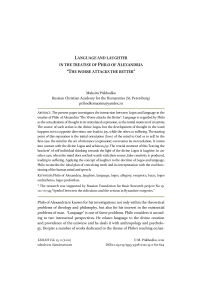Language and laughter in the treatise of Philo of Alexandria “The Worse attacks the Better”
Автор: Maksim Prikhodko
Журнал: Schole. Философское антиковедение и классическая традиция @classics-nsu-schole
Статья в выпуске: 2 т.15, 2021 года.
Бесплатный доступ
The present paper investigates the interaction between Logos and language in the treatise of Philo of Alexandria "The Worse attacks the Better". Language is regarded by Philo as the actualization of thought in its articulated expression, as the initial moment of creativity. The source of such action is the divine Logos, but the development of thought in the word happens in two opposite directions: one leads to joy, while the other, to suffering. The starting point of this separation is the initial orientation (love) of the mind to God or to self. In the first case, the mind in the act of utterance (expression) overcomes its own isolation. It comes into contact with the divine Logos and achieves joy. The crucial moment of this "leaving the brackets" of self individual thinking towards the light of the divine Logos is laughter. In another case, when the mind does not link words with their source, false creativity is produced, leading to suffering. Аpplying the concept of laughter to the doctrine of Logos and language, Philo reconciles the ideal plan of conceiving truth and its interpretation with the real functioning of the human mind and speech.
Philo of Alexandria, laughter, language, logos, allegory, exegetics, Isaac, logos endiathetos, logos proforikos.
Короткий адрес: https://sciup.org/147234440
IDR: 147234440 | DOI: 10.25205/1995-4328-2021-15-2-611-624
Список литературы Language and laughter in the treatise of Philo of Alexandria “The Worse attacks the Better”
- Conybeare, C. (2013) “Sarah, Philo, and the Laugh Beyond Laughter,” in The Laughter of Sarah Biblical Interpretation, Contemporary Feminism, and the Concept of Delight. New York: Palgrave Macmillan, 28–39.
- Destrée, P. Trivigno, F., eds. (2019) Laughter, Humor, and Comedy in Ancient Philosophy. New York, NY: Oxford University Press.
- Dillon, J. M. (1996) The Middle Platonists 80 B.C. to A.D. 220. Ithaca, New York: Cornell University Press.
- Goodenough, E. R. (1969) By Light, Light: the Mystic Gospel of Hellenistic Judaism. Amsterdam: Philo Press.
- Goold, G.P., ed., Colson, F.H. and Whitaker, G.H., tr. (1929–1939) Philo. vols. 1–8. Cambridge, MA: Harvard University Press.
- Halliwell, S. (2008) Greek Laughter: A Study of Cultural Psychology from Homer to Early Christianity. Cambridge: Cambridge University Press.
- Kamesar, A. (2004) “The Logos Endiathetos and the Logos Prophorikos in Allegorical Interpretation: Philo and the D-Scholia to the Iliad,” Greek, Roman, and Byzantine Studies 44, 163–181.
- Marcus, R., ed., Page, T.E., tr. (1908) Philo. Supplement II. Questions and Answers on Exodus. Cambridge, MA: Harvard University Press.
- Niehoff, M.R. (1995) “What is in a Name? Philo's Mystical Philosophy of Language,” Jewish Studies Quarterly 2.3, 220-252.
- Pohlenz, M. (1965) Die Begründung der abendländischen Sprachlehre durch die Stoa. Hildesheim: Kleine Schriften.
- Robertson, D. (2006) “Mind and Language in Philo,” Journal of the History of Ideas 67.3, 423–441.
- Robertson, D. (2008) Word and Meaning in Ancient Alexandria Theories of Language from Philo to Plotinus. Hampshire: Ashgate.
- Runia, D.T. (1988) “God and Man in Philo of Alexandria,” Journal of Theological Studies 39, 48–75.
- Runia, D.T. (1986) Philo of Alexandria and the Timaeus of Plato. Leiden: Brill.
- Schmidt, F. (2014) “The plain and laughter: the hermeneutical function of the sign in Philo of Alexandria,” in Aitken, J.K. and Paget, J.C., ed. The Jewish–Greek Tradition in Antiquity and The Byzantine Empire. New York: Cambridge University Press, 188–199.
- Winston, D. (1991) “Aspects of Philo’s Linguistic Theory,” The Studia Philonica Annual 3, 109–125.
- Winston, D. (1985) Logos and Mystical Theology in Philo of Alexandria. Cincinnati: Hebrew Union College Press.
- Wolfson, H. A. (1962) Philo Foundations of Religious Philosophy in Judaism, Christianity, and Islam. Vol. 1. Cambridge, MA: Harvard University Press.
- Svetlov, R. V. (2020) “Racional'naya teologiya: kazus Filona Aleksandrijskogo” Voprosy teologii 2.1, 65–74 (in Russian).
- Светлов, Р. В. (2020) “Рациональная теология: казус Филона Александрийского” Вопросы теологии 2.1, 65–74.


